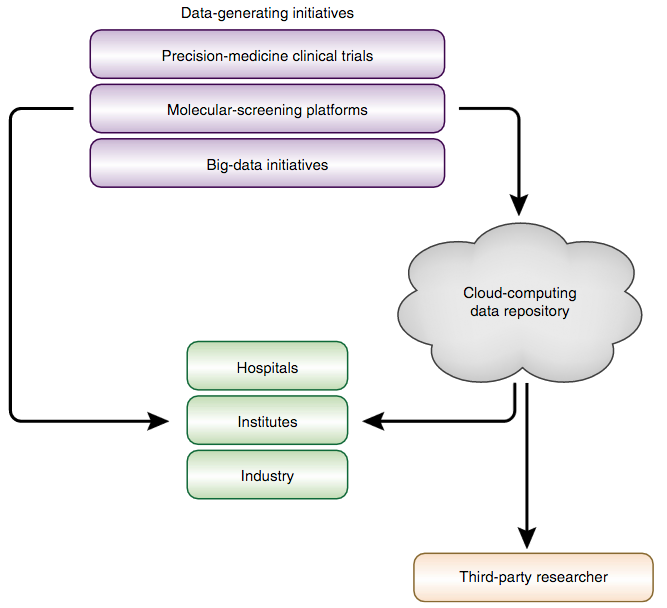Cancer-patient big data can save lives if shared globally
May 23, 2016

Data-sharing vision as facilitated by GA4GH through its working groups (credit: GA4GH)
Sharing genetic information from millions of cancer patients around the world could revolutionize cancer prevention and care, according to a paper in Nature Medicine by the Cancer Task Team of the Global Alliance for Genomics and Health (GA4GH).
Hospitals, laboratories and research facilities around the world hold huge amounts of this data from cancer patients, but it’s currently held in isolated “silos” that don’t talk to each other, according to GA4GH, a partnership between scientists, clinicians, patients, and the IT and Life Sciences industry, involving more than 400 organizations in over 40 countries. GA4GH intends to provide a common framework for the responsible, voluntary and secure sharing of patients’ clinical and genomic data.
A searchable global cancer database
“Imagine if we could create a searchable cancer database that allowed doctors to match patients from different parts of the world with suitable clinical trials,” said GA4GH co-chair professor Mark Lawler, a leading cancer expert from Queen’s University Belfast. “This genetic matchmaking approach would allow us to develop personalized treatments for each individual’s cancer, precisely targeting rogue cells and improving outcomes for patients.
“This data sharing presents logistical, technical, and ethical challenges. Our paper highlights these challenges and proposes potential solutions to allow the sharing of data in a timely, responsible and effective manner. We hope this blueprint will be adopted by researchers around the world and enable a unified global approach to unlocking the value of data for enhanced patient care.”
GA4GH acknowledges that there are security issues, and has created a Security Working Group and a policy paper that documents the standards and implementation practices for protecting the privacy and security of shared genomic and clinical data.
Examples of current initiatives for clinico-genomic data-sharing include the U.S.-based Precision Medicine Initiative and the UK’s 100,000 Genomes Project, both of which have cancer as a major focus.
Professor Lawler is funded by the Medical Research Council and Cancer Research UK.
Abstract of Facilitating a culture of responsible and effective sharing of cancer genome data
Rapid and affordable tumor molecular profiling has led to an explosion of clinical and genomic data poised to enhance the diagnosis, prognostication and treatment of cancer. A critical point has now been reached at which the analysis and storage of annotated clinical and genomic information in unconnected silos will stall the advancement of precision cancer care. Information systems must be harmonized to overcome the multiple technical and logistical barriers to data sharing. Against this backdrop, the Global Alliance for Genomic Health (GA4GH) was established in 2013 to create a common framework that enables responsible, voluntary and secure sharing of clinical and genomic data. This Perspective from the GA4GH Clinical Working Group Cancer Task Team highlights the data-aggregation challenges faced by the field, suggests potential collaborative solutions and describes how GA4GH can catalyze a harmonized data-sharing culture.